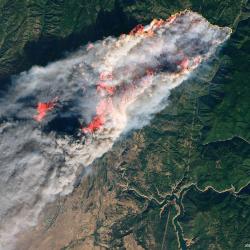UMD Awarded $388M NOAA Cooperative Agreement for Earth System Studies
The National Oceanic and Atmospheric Administration (NOAA) awarded the University of Maryland a five-year, $388 million cooperative funding agreement for collaborative research in Earth system science.
The agreement renews the Cooperative Institute for Satellite Earth System Studies (CISESS), a national consortium of researchers from more than three dozen academic and nonprofit institutions that are addressing the grand challenge of understanding how human activity interacts with Earth’s environment as a coupled system.
“This award confirms the excellence and ascent of CISESS, a true leader for Earth system and climate science research nationally,” said UMD President Darryll J. Pines. “Renewing UMD’s cooperative agreement with NOAA acknowledges the incredible accomplishments and dedication of researchers who are making discoveries that improve our ability to observe and predict changes in our planet. We look forward to what we will accomplish in partnership with NOAA.”
Launched in 2019 with a five-year, $175 million cooperative funding agreement, CISESS built on NOAA’s long-term partnership with UMD that includes the Cooperative Institute for Climate and Satellites from 2009 to 2019 and the Cooperative Institute for Climate Studies from 1984 to 2009.
CISESS has two primary locations: at UMD in College Park, Maryland, adjacent to NOAA’s Center for Weather and Climate Prediction; and in Asheville, North Carolina, collocated with NOAA’s National Centers for Environmental Information and hosted by NC State University.
“We’re delighted to see this recognition of the outstanding work of our CISESS scientists,” said CISESS Executive Director Ellen Williams, who is also a Distinguished University Professor Emerita of Physics at UMD. “Their efforts in collaboration with NOAA advance our understanding of the Earth and its atmosphere and address the profound goal of providing predictions of weather and climate that serve U.S. and global communities.”
E. Hugo Berbery, a research professor in UMD’s Earth System Science Interdisciplinary Center, serves as CISESS deputy director and leads the College Park location; Otis Brown, a research professor in the Department of Marine, Earth and Atmospheric Sciences at North Carolina State University, serves as director of the Asheville location.
In support of NOAA’s National Environmental Satellite, Data and Information Service, CISESS research activities cover three themes: satellite services, Earth system observations and services, and Earth system research.
Recent CISESS research highlights include:
- Building and deploying tools to observe and characterize lightning in the Washington, D.C. region and beyond
- Analyzing real-time NOAA weather and climate products in virtual reality
- Designing low-cost microwave radiometers for student training and supporting Joint Polar Satellite System programs
- Developing 3D-VISSYS, a 3D weather visualization system for the Maryland-D.C. region
- Using machine learning to emulate satellite passive microwave brightness temperature from the GOES advanced baseline imager
“Adding to the improvement of satellite products, our scientists also investigate the rapid decline of sea ice in the polar regions, the monitoring of ocean acidification and the development of a wildfire-centered lightning climatology database—all of which have widespread implications for societal prosperity and security as well as for the Earth's climate system,” Berbery said.
Over the last five years, CISESS researchers developed nearly 700 new or improved products; published more than 500 peer-reviewed research papers, 125 books and book chapters, and 40 NOAA technical reports; and mentored more than 300 high school, undergraduate and graduate students.
“Our work would not be complete without the participation of students who are trained to learn the basics of microwave remote sensing and the principles of instrument development,” Berbery added. “For early career scientists, CISESS has a seed grant program that promotes the development of new ideas and identifies emerging topics in the institute’s research topics.”
Over the next five years, CISESS researchers will continue using environmental data from satellites to develop new, more accurate products that help NOAA improve weather and climate forecasts and build resilience to extreme events. The researchers will also monitor the oceans, the atmosphere and the cryosphere and share that information for environmental decision-making. CISESS will provide the capabilities and expertise to improve systems for data access, quality, management, processing, analysis, assimilation, modeling, dissemination and visualization.
In addition to advancing research, CISESS researchers will continue to educate and train students and scientists in this field and pursue outreach and engagement activities with the scientific community, decision-makers and the public.
“We look forward to continuing to support NOAA's efforts to provide users across the nation and around the world with actionable information,” Brown said. “Our staff will be enhancing and developing datasets by blending information from multiple observing systems, expanding cloud-based access to NOAA data, engaging with users to better meet their needs, and advancing efforts to understand and respond to the challenges of climate change.”
In addition to UMD and NC State, research at CISESS includes collaborations with the University of North Carolina System; the University of Maryland, Baltimore County; the University of Alabama in Huntsville; the City University of New York; George Mason University; Oregon State University; Howard University; the University of Michigan; the University of South Carolina; the University of Georgia; University of California, Irvine; South Dakota State University; Florida International University; and the University of Nebraska Medical Center.
“Our world continues to face enormous challenges due to the impact of climate change and extreme environmental events on society,” said Amitabh Varshney, dean of UMD’s College of Computer, Mathematical, and Natural Sciences. “I am encouraged knowing that these challenges are being addressed by the University of Maryland-led CISESS Consortium, which has the necessary experience and expertise to provide the foundation for advances in Earth system modeling and data analysis required to meet the nation’s needs.”







